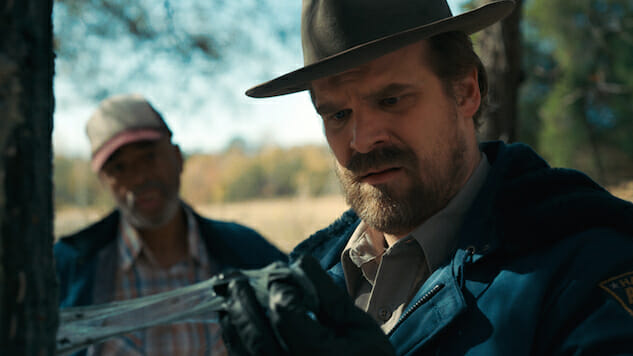Stranger Things Embraces Growth (Especially Hopper’s) in a Rousing Season Finale
(Episode 2.09)
Photo: Courtesy of Netflix
After all of Season Two deals with the fallout from Season One, the finale, “The Gate,” gives Stranger Things the opportunity to embrace the growth that’s been fermenting under the surface. Much of this growth needs to come from the one character whose overtures to progress have been hit-and-miss so far: Hopper (David Harbour).
Hopper, for all his good intentions, is almost as big a threat this season as the actual demons. He isolates Eleven (Millie Bobby Brown) for her own good (questionable at best), bogs down the correct diagnosis of Will (Noah Schnapp), and endangers himself and others. As The Verge’s Tasha Robinson rightly points out, he’s a key element in Bob’s death, the gung-ho dunce exploring secret alien tunnels alone. His outbursts and failures as a foster parent cause us, in a roundabout way, to suffer through Eleven’s mini-vacation. As the season winds down and the rest of the characters come together in the warm 1980s fashion that we’ve been trained to expect from the show, Hopper’s in dire need of some development from his failures and immaturities.
He’s the grumpy breakout hero we’re supposed to root for (to win the day and to get with Winona Ryder’s Joyce, as many intimate moments push towards), but he’s best as a supporter. Allowing Hopper to fail is one thing, but allowing him to be secondary is entirely different. That takes the self-awareness that led to his sad-sack confessions to Eleven and actualizes them. A character who blames himself for the death of his daughter shouldn’t be emotionally stunted and the action hero. He should find solace in doing what he couldn’t before, which is helping others reclaim their lives. And that’s what happens in “The Gate”.
This first manifests in Mike (Finn Wolfhard) punching the absolute hell out of Hopper for hiding Eleven and playing God with everyone’s emotions. Enduring the stereotypical confrontation is made far easier by Wolfhard and Harbour’s rapport, and by the episode’s continual dismantling of hyper-masculine posturing. Everyone splits up, without ego, to tackle the remaining problems (demo-dogs, the nasty gate between worlds, possessed Will). The party’s final missions are upon them as the campaign draws to a close, and Eleven’s greaser-Aragorn look is as badass as any to lead the most important arm of the group.
Splitting the party is ill-advised in any Dungeons and Dragons campaign, but assigning different tasks to the small army of characters is satisfying in this narrative. Steve (Joe Keery) becomes even more of a babysitter than before, while Hopper and Eleven drive to the gate and Will’s family (plus Nancy, for God knows what reason) head to Hopper’s cabin to bake a demon out of a kid. The main thing to remember here is—oh wait, sorry, remember Billy? Played by Dacre Montgomery? Has no reason to be here? Well, it’s high time he served some purpose, even if it’s to serve some The Boy Next Door vibes to Nancy and Mike’s mom, Karen (Cara Buono).
This ridiculous, hilarious scene is honestly one of the best parts of the season because it is so odd. Karen is an empty outline that made it through costuming, so seeing her get a horned-up side story is just bizarre and brazen enough to delight for the few minutes it happens. Billy may be on the hunt for Max (Sadie Sink), but his role as an anthropomorphic romance novel cover is far more fun (and it gives a mom some always-admirable sexual agency).
Time to abandon that—sorry, Cara, you’re a great actress—so Steve and Billy can have their mullet-off. Steve, who’s been losing control in a hilariously written and edited scene, tries to prevent the kids from going to burn down the tunnels as a distraction to make Eleven’s life easier. Their grand pyrotechnic schemes are briefly interrupted by the fistfight every high school dick-measuring contest should eventually become: one with well-shot physical details (Steve sliding across the drawing-laden floor), hazy, excited camerawork, and a cacophony of kids screaming. It’s madness and clarity rolled into one, because after the fight is won (thanks to Max), we’re allowed to linger on consequences—objectively, the loser is Steve’s Hamburger Helper face—that visualize the violent banality of the combatants’ rivalry.
-

-

-

-

-

-

-

-

-

-

-

-

-

-

-

-

-

-

-

-

-

-

-

-

-

-

-

-

-

-

-

-

-

-

-

-

-

-

-

-








































